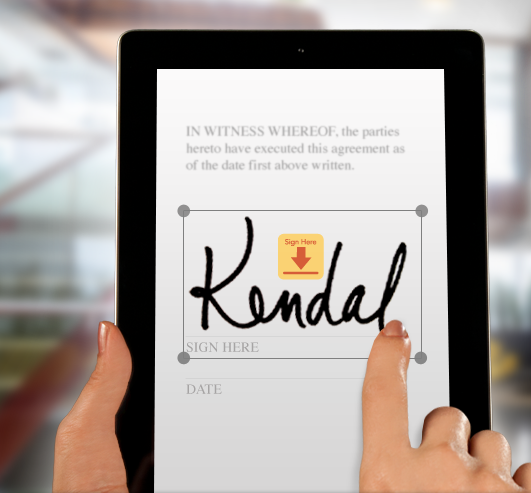
When it comes to signing contracts and paperwork for real estate transactions, don’t be surprised if your agent asks you to use electronic signature software (ESS). It’s a simple and secure time saver that solves many problems in the real estate industry.
Here’s how it works: When you have documents to sign, initial, date or otherwise acknowledge, your agent will provide the documents to you, in a scanned form via email. Typically, when using an ESS for the first time, you ‘ll agree to those pesky terms and conditions (which, like all contracts, you should read), and then ‘pick’ a signature. You won’t be using a pen or stylus to sign on a screen, you’ll be using an electronic version of your name and initials, and a click of your mouse. Once you pick the style of your name you prefer (and most software lets you change this so you’re not stuck with it), this becomes your signature. Your email address is used as your security feature, meaning that only people (you) who have access to your email account, with your user name and password, can access and sign your documents.
When you open the attachment of docs to sign, prompts, set up by your agent, will show you where to sign. You can’t mess it up. Or forget to sign. Or miss a signature. The agent sets this up for you…just follow on the-screen prompts. When you’re done, the document then automatically routes to other parties, who also need to sign or acknowledge that they received it. Once everyone has signed, you get a copy emailed to you, with all signatures.
Here’s why it’s better than paper: Paper requires, well, paper, which can get lost, damaged, forgotten. Paper means that two people have to either be in the same place physically at the same time (impossible with out-of-state sellers, sellers who are on military leave, out of town for vacation or work). Paper has to be delivered by some method to each each party where loss and delays can occur. Paper means that additional copies are made-not a very green practice these days. Paper can be more easily forged and forgotten.
Here’s why it’s better than scanning and/or faxing:
- No poorly scanned documents that are hard to read;
- Neither party need to have a scanner or a fax machine
- No issues with low toner or fax machines out of paper
- No fax machines in public places showing private documents. No more lost pages. No follow-up calls to see if the fax went through, the pages were all received. No having to physically pick up faxed copies at a specific location. Without a way to track who gets which faxed pages, and when, there’s no accountability for the sender or the receiver… (You get the idea!)
Nervous about trying something new? Don’t reject the electronic signature option automatically. In the same way that we expected a paper ticket for airline travel, many of us now use e-tickets. And the advantages of electronic signatures are not just for agent, title companies and lenders, but for buyers and sellers, too.
Have your Nest agent explain how it works for you in detail so you’re comfortable, and get your electronic signature ready!